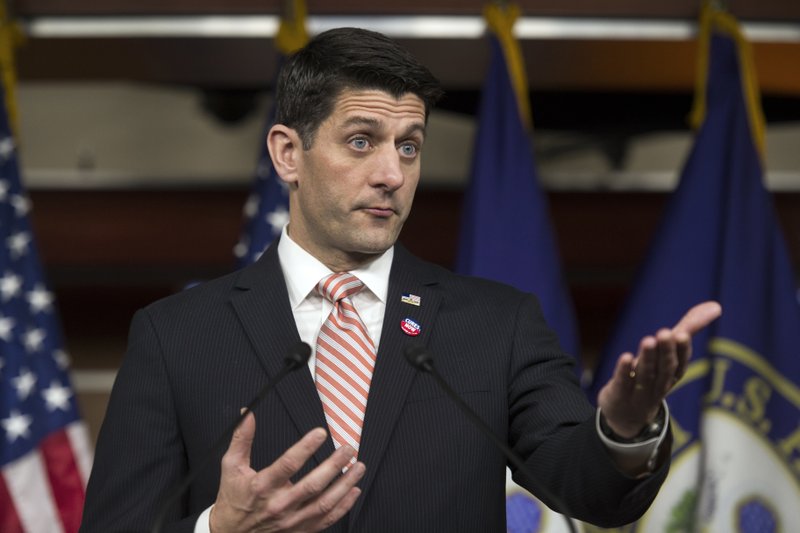WASHINGTON -- The 114th Congress, marked by two years of partisan acrimony punctuated by the occasional burst of bipartisan deal-making in the waning days of Barack Obama's presidency, has limped to a close.
Ahead is uncertainty, as the GOP prepares to assume monopoly control over Washington for the first time in a decade come January, with Congress' relationship with an untested new president yet to be determined.
Thus far, congressional Republicans have been highly deferential to President-elect Donald Trump, even when his pronouncements fly in the face of long-held GOP goals such as free trade and limited government. The question hanging over the next Congress will be whether Trump prevails on issues such as his call for a $1 trillion infrastructure bill and steep tariffs to prevent outsourcing -- or whether congressional Republicans steer him in a direction more in line with traditional GOP beliefs.
"We see the fact that we were given this opportunity to have unified government as a way to get this country back on track," House Speaker Paul Ryan, R-Wis., said in his final news conference before the House adjourned for the year. "And that includes getting our nation's finances back on track."
When lawmakers return to Washington on Jan. 3 and the 115th Congress gets underway, the Senate will immediately begin taking the steps necessary to pass a repeal of Obama's health care law. Republicans hope to present Trump with legislation to sign not long after his inauguration Jan 20.
Yet six years after Obama's health care overhaul became law, Republicans still do not know exactly what they'll replace it with, and they disagree over how much time they should allow themselves to put a replacement into place.
Cooperation from Senate Democrats is likely to be needed for the replacement, but Democrats say they won't be lending their support. That leaves the outcome of Republicans' push to repeal "Obamacare" unpredictable, and political risks high for the GOP. Republicans often accuse Democrats of overreaching by jamming laws through on party-line votes and say Democrats lost congressional majorities in the past as a result. Yet now Republicans must avoid committing the same mistakes themselves.
"We'll be moving in a different direction as a country, and I think we'd be wise to show some humility and move deliberately and make sure we don't make our changes, that we don't go too far too fast," said Sen. Lamar Alexander, R-Tenn. "That's always the temptation after a big win and we saw what happened when President Obama did that, and made a lot of mistakes. We don't want to make mistakes."
Sen. Mike Lee, R-Utah, and Rep. Mark Walker, R-N.C., wrote in a joint opinion piece Friday for National Review that voters have given Republicans a "historic opportunity."
"They gave us the House, the Senate, a majority of governor's seats, and the White House," Lee and Walker wrote. "Now we must honor the trust they have put in us." They added, "Congress and the Trump administration can't afford to fumble the repeal of Obamacare."
Before leaving Washington for the final time this year, Republicans boasted of their achievements over the past two years. Ryan reeled off a list including a new bipartisan bill to spend billions of dollars to conduct medical research; ending the ban on exporting crude oil; new sanctions on Iran and North Korea; and a long-term highway bill. He also cited a bipartisan education rewrite; a long-sought overhaul of Medicare's payment systems to doctors; a rescue package for Puerto Rico; money to attack the Zika virus; new food labeling requirements; and more.
"Bipartisanship is not rare," Ryan insisted, "it is just rarely noted."
Left unsaid was how much was undone by a Congress that froze out Obama's Supreme Court nominee, Merrick Garland; let a 12-nation Asia trade deal languish; and took no action to address immigration, among other issues. Fractures within the GOP forced House Speaker John Boehner, R-Ohio, to resign, avoiding a conservative effort to oust him. A reluctant Ryan eventually sought the job.
In its final session, Congress sent legislation to Obama's desk that would continue reviews of racially motivated killings in the civil-rights era that are now cold cases.
It would indefinitely extend a 2007 law that calls for a full accounting of race-based deaths, many of which had been closed for decades. The law expires next year.
More than 100 cases from the 1960s and earlier have been checked out so far, with one conviction. But new racially suspicious deaths have been identified for investigation. In many cases such crimes were poorly investigated and prosecutions were rare.
The bill is named after Emmett Till, a 14-year-old black boy killed in 1955 after whistling at a white woman. His killers were acquitted of murder but later admitted their crimes to a reporter and couldn't be retried.
Adjournment in the early morning Saturday -- the Senate finally wrapped up at 5:39 a.m. -- came only after one last partisan squabble, this one over health benefits for retired coal miners. With a group of miners watching from the gallery and a government shutdown threatening at midnight, the Senate finally voted to pass a short-term government funding bill that will keep the lights on in federal agencies and departments through April.
Information for this article was contributed by Mary Clare Jalonick of The Associated Press.
A Section on 12/11/2016
